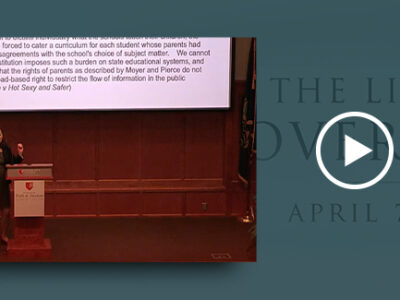The influence of President Bush’s faith on his foreign policy has been greatly exaggerated by both friends and foes. Enthusiasts proudly call the president’s foreign policy “faith based.” Detractors angrily assert that the president invaded Iraq and removed Saddam Hussein because he felt God called on him to do so.
But while Mr. Bush has given a number of reasons for invading Iraq – from its past and potential use of weapons of mass destruction to its suspected stockpiles of such weapons to its sponsorship and harboring of terrorists – a belief that the Almighty told him to send in the marines was not among them. “I’m surely not going to justify the war based on God,” he told Bob Woodward in “Plan of Attack.”
The fact is that George W. Bush’s foreign policy was defined by Sept. 11, not by his faith. Had it not been for Sept. 11, he would be shaping a presidency around compassionate conservatism, a domestic policy agenda that is rooted in his Christianity. And though Mr. Bush surely wanted Saddam Hussein gone before then, it was Sept. 11 that provided his sense of urgency and, as the president has put it many times, “changed everything.”
So, then, how does his faith affect his foreign policy, and, more specifically, his vision for the Middle East? In subtle but important ways.
Mr. Bush believes that God has implanted a desire for freedom in all human hearts. “I believe God wants everybody to be free,” he said in the presidential debate on Wednesday. In this case, “everybody” means Christians, Jews, Muslims and so on. Thus, he believes that Middle Eastern Muslims can be and should be free, because that is God’s desire for them.
Now this is where critics can forge a substantive critique of the influence of Mr. Bush’s faith on policy. Those concerned about separating church and state might maintain that he is on dangerous ground here, predicating a grand vision on a specific biblically based belief, one that may or may not be true. That’s a reasonable argument based on a real difference over a core belief.
On the other hand, those who contest this principle need to realize that Mr. Bush’s thinking is not that different from the system of belief embraced by the founders – particularly the notion that all human beings are “endowed by their Creator” with certain unalienable rights, one of which is liberty. Jefferson and John Locke subscribed to that, as did Republicans like Lincoln and Reagan and Democrats like Woodrow Wilson and John F. Kennedy. So have liberal and conservative thinkers and leaders over generations.
More specifically, one might counter that Mr. Bush’s principle seems not to apply to the Middle Eastern Arab nations, none of which have produced an enviable democracy. In other words, he is fighting experience and history. This, too, is a justifiable criticism, but one that George W. Bush adamantly rejects.
In any case, the larger Bush vision for the Middle East is not merely influenced by his faith-based conviction that God wants all people to be free. A key added motivation is a theory popular in the academic field of international relations in the 1990’s: the concept of a “democratic peace.” This theory holds that democracies tend not to fight one another. Consequently, to the extent that the hostile Middle East becomes more democratic, the region may become more peaceful. Mr. Bush hopes to sow the seeds of such a long-term peace in Afghanistan and Iraq. It’s a big if, of course. If he’s wrong, he may have created a disaster. If he’s right, he may have changed the course of history.
Yes, Mr. Bush’s faith influences his foreign policy, but not in the ways we commonly think. And it does so in a manner that will make some people uncomfortable while inspiring others. It is crucial, however, that we make distinctions between what George W. Bush really believes and what we think he believes.



